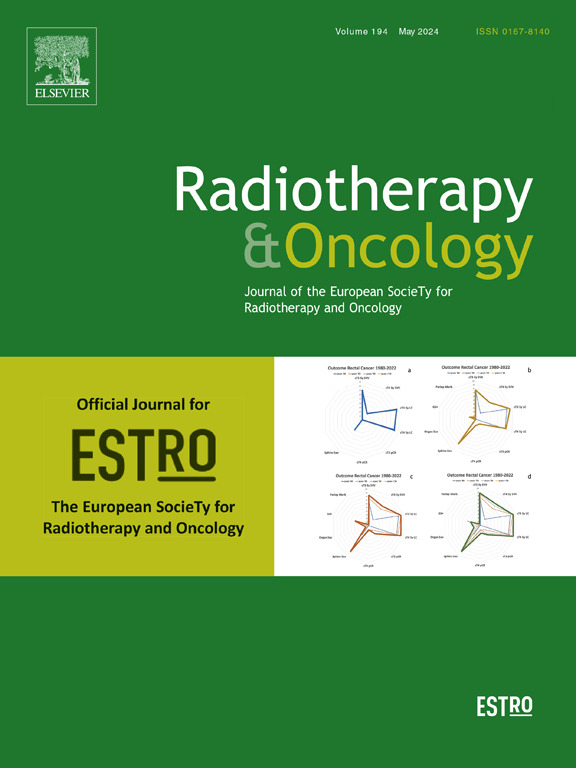Ongoing prospective studies on reirradiation: A systematic review of a clinical trials database
IF 4.9
1区 医学
Q1 ONCOLOGY
引用次数: 0
Abstract
Introduction
Reirradiation has gained increasing interest, as advances in systemic therapy increase the survival of patients with cancer, and modern radiation techniques allow more precise treatments. However, high-quality prospective evidence on the safety and efficacy of reirradiation to guide clinical practice remains scarce. This systematic review evaluates ongoing prospective studies on reirradiation to identify research gaps and priorities.
Methods
A systematic review of ClinicalTrials.gov was conducted on July 11, 2024, using search terms related to reirradiation. Inclusion criteria were prospective studies that were “recruiting,” “not yet recruiting,” or “active, not recruiting.” Studies with published results, retrospective, and in-silico studies were excluded. The review followed PRISMA 2020 guidelines and recommendations for systematic searches of clinical trial registries.
Results
Among 1026 identified studies, 307 were screened, 99 were included. Fourty (40%) focused on central nervous system (CNS), 23 (23%) head and neck, and 17 (17%) on pelvic reirradiation. Most studies (90%) were interventional, with 32 (32%) phase II and 4 (4%) phase III trials. Sixteen trials were randomized (RCTs), including the 4 phase III trials for recurrent glioblastoma, rectal and nasopharyngeal cancer. Ten dose escalation trials focus on recurrent prostate, rectal, and non-small cell lung cancer as well as glioma. Modern high-precision radiotherapy techniques were frequently used, with 21 (21%) studies using stereotactic radiotherapy and 17 (17%) using particle therapy. Combinations with systemic therapies were investigated in 41 (41%) studies.
Conclusion
Ongoing studies most frequently focus on CNS, head and neck, and pelvic reirradiation. There remains a critical need for RCTs, in particular for lung, breast, and gynecological cancers. Dose escalation trials, application of precision radiation techniques and combinations with modern systemic therapy may help define the optimal multimodality treatment schedules.
正在进行的再照射前瞻性研究:临床试验数据库的系统回顾。
导言:随着全身治疗的进步提高了癌症患者的生存率,现代放射技术也使治疗更加精确,再照射越来越受到关注。然而,用于指导临床实践的再照射安全性和有效性的高质量前瞻性证据仍然很少。本系统综述评估了正在进行的有关再照射的前瞻性研究,以确定研究缺口和重点:方法:2024 年 7 月 11 日,使用与再照射相关的检索词对 ClinicalTrials.gov 进行了系统性回顾。纳入标准为 "正在招募"、"尚未招募 "或 "正在进行但未招募 "的前瞻性研究。已发表结果的研究、回顾性研究和内部研究均不纳入。综述遵循了 PRISMA 2020 指南和系统检索临床试验登记处的建议:在 1026 项确定的研究中,筛选出 307 项,纳入 99 项。其中40项(40%)侧重于中枢神经系统(CNS),23项(23%)侧重于头颈部,17项(17%)侧重于盆腔再照射。大多数研究(90%)为介入性研究,其中 32 项(32%)为 II 期试验,4 项(4%)为 III 期试验。16项试验为随机试验(RCTs),包括针对复发性胶质母细胞瘤、直肠癌和鼻咽癌的4项III期试验。10项剂量升级试验主要针对复发性前列腺癌、直肠癌、非小细胞肺癌以及胶质瘤。现代高精度放疗技术被频繁使用,其中21项研究(21%)使用了立体定向放疗,17项研究(17%)使用了粒子疗法。41项(41%)研究探讨了与全身疗法的结合:结论:正在进行的研究多集中于中枢神经系统、头颈部和盆腔再照射。目前仍急需进行研究性试验,尤其是针对肺癌、乳腺癌和妇科癌症的研究。剂量升级试验、精确放射技术的应用以及与现代系统疗法的结合可能有助于确定最佳的多模式治疗方案。
本文章由计算机程序翻译,如有差异,请以英文原文为准。
求助全文
约1分钟内获得全文
求助全文
来源期刊

Radiotherapy and Oncology
医学-核医学
CiteScore
10.30
自引率
10.50%
发文量
2445
审稿时长
45 days
期刊介绍:
Radiotherapy and Oncology publishes papers describing original research as well as review articles. It covers areas of interest relating to radiation oncology. This includes: clinical radiotherapy, combined modality treatment, translational studies, epidemiological outcomes, imaging, dosimetry, and radiation therapy planning, experimental work in radiobiology, chemobiology, hyperthermia and tumour biology, as well as data science in radiation oncology and physics aspects relevant to oncology.Papers on more general aspects of interest to the radiation oncologist including chemotherapy, surgery and immunology are also published.
 求助内容:
求助内容: 应助结果提醒方式:
应助结果提醒方式:


